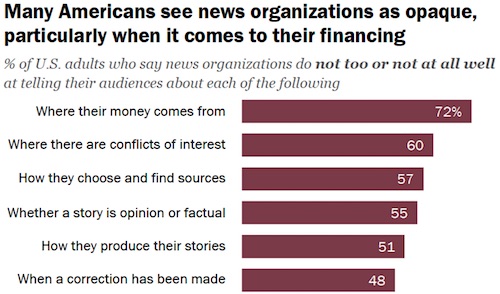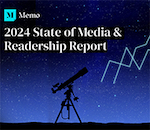Americans’ skepticism toward media institutions overshadows any confidence they have in today’s news industry, but most admit the possibility that their trust in the news could someday be won over, according to a new report released by the Pew Research Center.
The report, which examined Americans’ trust in news organizations as well as what these organizations can do to regain the public’s confidence, found that Americans tend to express far more negative than positive views about the news media’s role in society.
More than half of those polled (53 percent) believe media organizations don’t care about the people they report on, and more than a third (39 percent) think media groups don’t act professionally, hurt democracy (36 percent) or are too critical of the country (35 percent).
A majority of those polled (40 percent) also believe the public has too much confidence in the news media, and nearly half of respondents (48 percent) think news organizations are currently declining in influence.
Americans appear to take particular issue with news organizations’ perceived transparency. More than half (60 percent) believe news outlets do an insufficient job disclosing potential conflicts of interest, how they choose and find sources (57 percent), whether a story is an opinion piece or factual reporting (55 percent) or how a story is produced (51 percent). Respondents especially believe news organizations do an insufficient job explaining to the public how they’re funded (72 percent).
 |
Respondents also held strong views regarding why they think mistakes often make their way into news stories. While more than half blame careless reporting (55 percent) or today’s accelerated pace for breaking news (53 percent) as the reason significant mistakes appear in news coverage, more than two-thirds (69 percent) believe news organizations deliberately try to cover up those mistakes and nearly half (48 percent) feel media outlets aren’t transparent when a correction has been made to a report. Nearly half of those polled (44 percent) believe reporting errors are borne out of a desire to willfully mislead the public.
As usual, partisanship appears to be behind at least some of this sentiment: 60 percent of respondents who identified as Republican or Republican-leaning think mistakes make their way into news stories due to a deliberate desire to mislead audiences, compared to only 32 percent of Democrats or Democrat-leaning respondents who feel this way.
The report suggests that Americans’ attitudes toward the media may be at least tangentially related to a perceived lack of connection with the coverage media outlets provide. While more than half of those surveyed (55 percent) feel it’s important for audiences to have personal connections with their news sources, an even larger number (57 percent) believe their news outlets don’t particularly value them or understand people like them (59 percent). Perhaps, as a result, nearly two-thirds (63 percent) claim they don’t feel particularly loyal to any of the outlets from which they get their news.
Finally, the report discovered that Americans believe that maintaining some level of skepticism toward the news media is healthy, as roughly two-thirds (63 percent) claimed that a public skeptical of the media makes for a better society, nearly twice the number of those who say it’s better when the public trusts the media (36 percent). Three-quarters (75 percent) maintained that it’s possible that the current level of confidence they have in the news media could someday improve.
Pew’s findings were based on a survey of more than 10,300 U.S. adults conducted between February and March. Respondents were drawn from the nonpartisan think tank’s American Trends Panel, a nationally representative list of randomly selected U.S. adults.


 Trump Media & Technology Group today reported a $58.2M net loss on $4.1M in 2023 revenues, a disclosure that drove its stock price down 22.6 percent to $47.96.
Trump Media & Technology Group today reported a $58.2M net loss on $4.1M in 2023 revenues, a disclosure that drove its stock price down 22.6 percent to $47.96. Barry Pollack, an attorney at Wall Street’s Harris St. Laurent & Wechsler, has registered Julian Assange as a client with the Justice Dept. “out of an abundance of caution.”
Barry Pollack, an attorney at Wall Street’s Harris St. Laurent & Wechsler, has registered Julian Assange as a client with the Justice Dept. “out of an abundance of caution.” Paramount Global to slash 800 jobs in what chief executive Bob Bakish calls part of an effort to “return the company to earnings growth"... Rolling Stone editor-in-chief Noah Shachtman is exiting at the end of the month due to disagreements with chief executive Gus Wenner over the direction the magazine is taking... The New York Times broke the $1 billion barrier in annual revenue from digital subscriptions in 2023... Press Forward is investing more than $500 million to strengthen local newsrooms.
Paramount Global to slash 800 jobs in what chief executive Bob Bakish calls part of an effort to “return the company to earnings growth"... Rolling Stone editor-in-chief Noah Shachtman is exiting at the end of the month due to disagreements with chief executive Gus Wenner over the direction the magazine is taking... The New York Times broke the $1 billion barrier in annual revenue from digital subscriptions in 2023... Press Forward is investing more than $500 million to strengthen local newsrooms. The majority of news articles are read within the first three days of publication, according to a recent report.
The majority of news articles are read within the first three days of publication, according to a recent report. The Los Angeles Times gives pink slips to 115 people or 20 percent of its newsroom staff... TIME is also laying off about 30 employees, which is approximately 15 percent of its editorial staff... The Baltimore Banner, which was launched by Stewart Bainum in 2022 after he failed to buy the Baltimore Sun, added 500 subscribers per day in the three days following Sinclair Broadcast Group's deal to purchase the Sun.
The Los Angeles Times gives pink slips to 115 people or 20 percent of its newsroom staff... TIME is also laying off about 30 employees, which is approximately 15 percent of its editorial staff... The Baltimore Banner, which was launched by Stewart Bainum in 2022 after he failed to buy the Baltimore Sun, added 500 subscribers per day in the three days following Sinclair Broadcast Group's deal to purchase the Sun.


 Have a comment? Send it to
Have a comment? Send it to 
No comments have been submitted for this story yet.